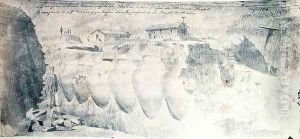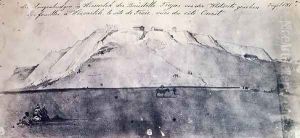Heinrich Schliemann Paintings
Heinrich Schliemann was a German businessman and a pioneer in the field of archaeology, who is best known for his work in discovering the site of ancient Troy. Born on January 6, 1822, in Neubukow, Mecklenburg-Schwerin (now in Germany), Schliemann was the son of a Protestant minister. His fascination with Homer's epics, the Iliad and the Odyssey, began in his childhood, and this interest laid the foundation for his later pursuits in archaeology. Despite his early passion for ancient history, Schliemann's initial career was in business. He made his fortune as a merchant and trader, which enabled him to retire early and dedicate his life to archaeology.
Schliemann's archaeological career began in the 1860s. Without formal training in archaeology, he applied a mix of intuition, determination, and innovative methods to his excavations, often drawing criticism for his destructive techniques. In 1871, he began excavations in Hissarlik, northwestern Turkey, convinced that it was the site of ancient Troy. His discoveries there, including a layer he believed to be the Troy of the Trojan War and a cache of gold and other artifacts he named 'Priam's Treasure,' captured the public imagination. However, his identification of the layers and artifacts has been the subject of debate and revision by later archaeologists.
Schliemann's work extended beyond Troy. He also excavated at Mycenae in Greece, where in 1876 he discovered the so-called 'Mask of Agamemnon,' a funeral mask crafted from gold, which he claimed belonged to the legendary Mycenaean king. His work at Mycenae provided further evidence for the historical basis of the Homeric epics and contributed to the study of Mycenaean civilization. Despite the controversies surrounding some of his claims and methods, Schliemann's contributions to archaeology were significant. He brought attention to the field, inspired further archaeological exploration, and laid the groundwork for the scientific study of ancient civilizations.
Heinrich Schliemann's life was as colorful and controversial as his archaeological career. He was multilingual, claimed to have taught himself numerous languages to aid in his travels and studies, and was known for his self-promotion and ambition. His personal life, including his marriage to Sophia Engastromenos, whom he involved in his archaeological work, was also subject to public interest. Schliemann passed away on December 26, 1890, in Naples, Italy, but left behind a legacy that forever changed the field of archaeology. His determination to find the historical truth behind the Homeric legends has inspired generations of archaeologists and historians.

